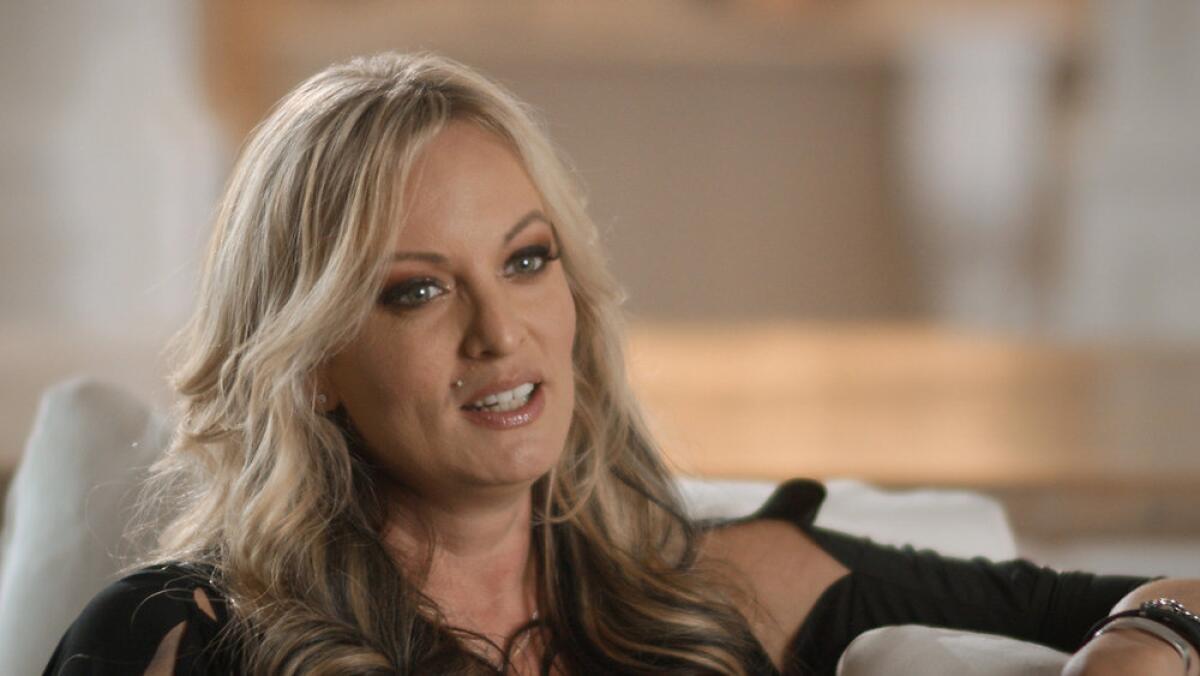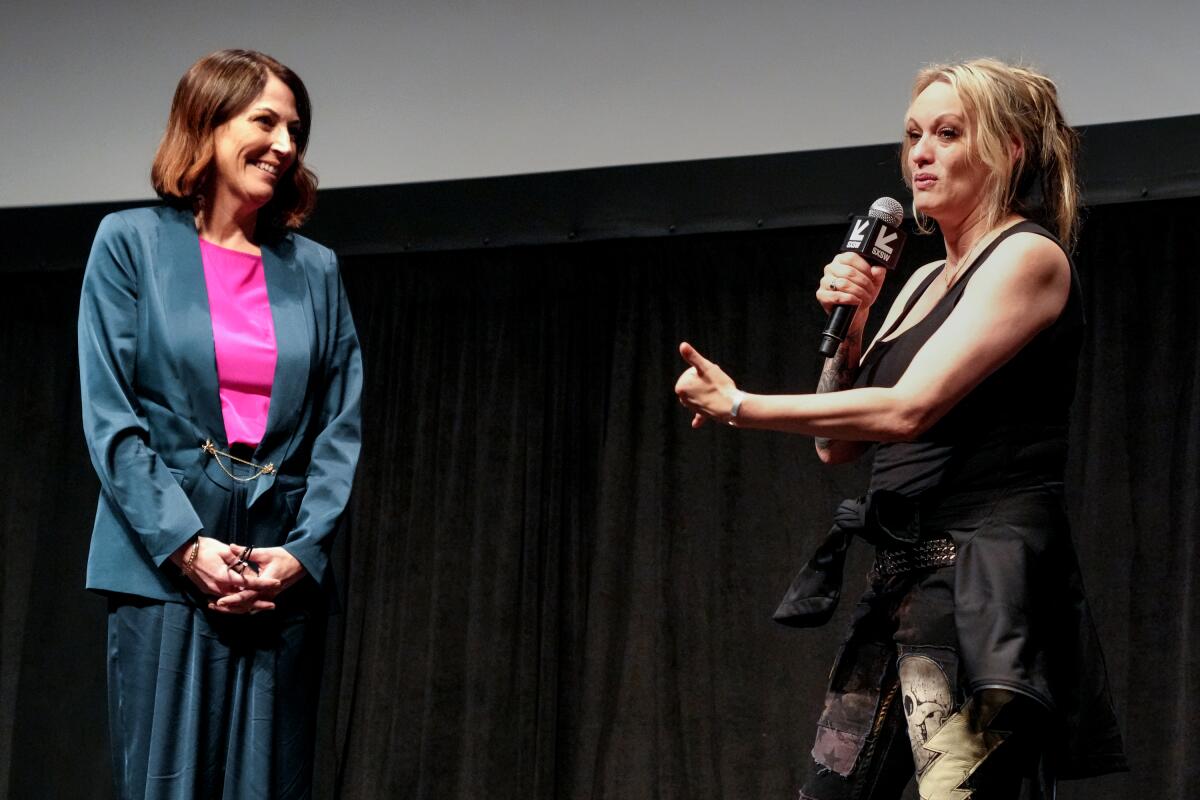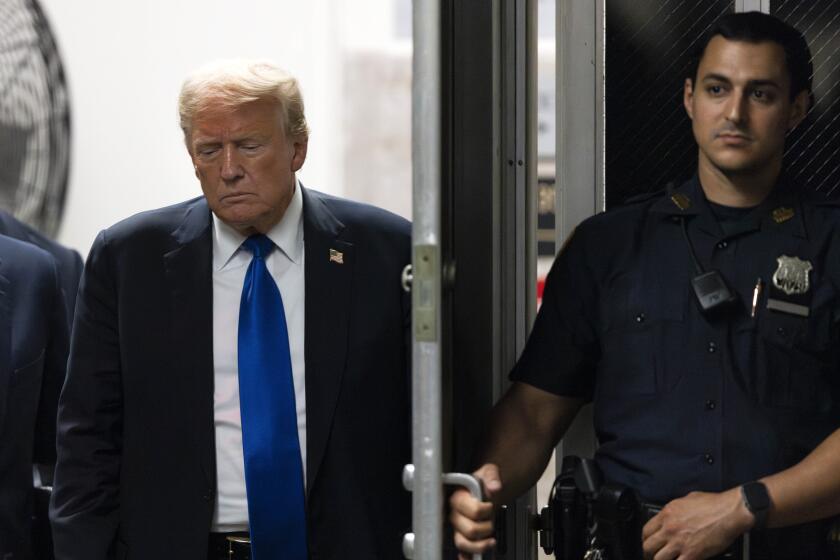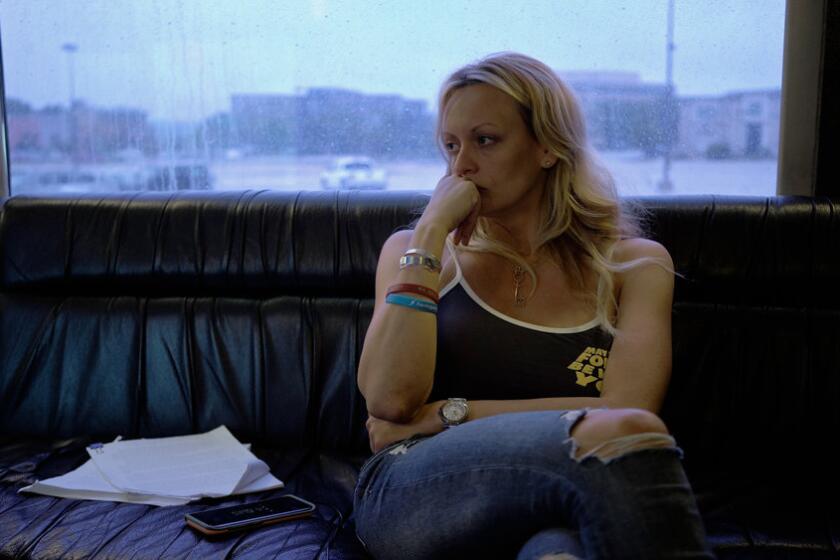‘Stormy’ filmmakers explain how Daniels helped convict Trump: ‘Let’s give the woman her due’

On Thursday, a jury foreman announced the word “guilty” 34 times.
It was a history-making moment, the conclusion to a trial that made Donald Trump the first former president in U.S. history to be convicted of felony charges. The case revolved around falsified business records related to a hush-money payment made in the weeks before the 2016 election. One of the recipients? Adult filmmaker Stormy Daniels, whose real name is Stephanie Clifford.
“When we started making this film, people had a really weird love-hate relationship with Stormy,” said Erin Lee Carr, one of the producers of “Stormy.” “The vast majority of people only knew her as a porn star that slept with Donald Trump. We set out to tell the story of this full, three-dimensional person who was not believed time and time again.”
Jurors deliberated for 9½ hours over two days before convicting former President Trump of all 34 counts he faced in a hush-money scheme surrounding the 2016 election.
Daniels has long maintained that when she met Trump in 2006 at a charity golf tournament, they had sex — though Trump has continually denied they had a relationship — and that it was consensual. Her testimony at Trump’s New York trial, which was not televised, reflects what she has said over the years, but her portrait of that night was also more nuanced: Daniels testified that she didn’t feel physically or verbally threatened but realized that he was “bigger and blocking the way.” “The next thing I know was: I was on the bed,” she said.
It’s similar to what she told the “Stormy” filmmakers. The documentary premiered on Peacock in March, days before Trump’s trial was originally slated to begin. “I don’t remember how I got on the bed,” she told director Sarah Gibson, who co-produced the documentary along with Carr. During Daniels’ testimony, Trump’s lawyer Susan Necheles questioned her about the details of the story, saying, “You made all this up, right?” Daniels responded: “No.”
“There’s so much more work to do with regards to believing women’s stories, and giving voice to people with less power,” Gibson said. “For us, the fight continues.”
Director Sarah Gibson and producer Erin Lee Carr say their Peacock documentary on Stormy Daniels shows how her life and livelihood hang in the balance.
For now, Daniels and her role in the trial will be for the history books. “There’s that blue colored tab [in history textbooks] and it explains who Stormy Daniels is,” said Carr, imagining what it would look like. “Please let it say Stormy Daniels, porn director and star. Let’s give the woman her due. Artist and then whistle-blower.”
On Friday morning, Gibson and Carr spoke over Zoom about the verdict, what Daniels told them after and during the trial and how the public has reacted to their documentary, which was recently released in U.K. This conversation has been edited for length and clarity.

Where were you when you heard the verdict and what were you thinking as the guilty charges were being announced?
Sarah Gibson: We were on FaceTime together actually. [Erin] was at the tennis court watching and I was at home on my couch in complete and utter disbelief. I had been following the trial like a hawk. I really felt that it was possibly going to end in a hung jury, like a lot of other people, and was blown away. In fact, I woke up this morning thinking I had dreamed it all and was almost scared to read the news because I couldn’t believe it. We immediately got to work on updating the text cards at the end of our film to reflect the latest news.
Have you spoken to Stormy since the verdict came out?
Gibson: I have. She was sending me photographs yesterday from home of her and her daughter. It was very emotional for me because at the very beginning, when we started this project, I said, “Why are you doing this?” And she said, “I’m doing this so my daughter can know the truth.” That was very powerful.
What about during the trial?
Gibson: We did. It was very rough for her the first day on the stand. Then she did such an incredible job in the cross examination. I had been in contact with her just over text [message] throughout that process.
Ultimately, did you feel her testimony reinforced the points made in the film?
Erin Lee Carr: It is the actual ending of this never-ending saga. She wasn’t believed. And guess what? A jury believed her and believed her wholeheartedly, all of her testimony, which led to 34 counts in a guilty verdict. We were beside ourselves. We made the film that we wanted to make ... her credibility is so much there, through the power of what Sarah did, but also through the criminal justice system. The epilogue to this that we’re still hoping gets figured out is if she still owes Donald Trump upwards of $600,000. [Daniels owes Trump legal fees for a defamation lawsuit she lost but contends the suit was filed without her permission by her former lawyer, Michael Avenatti.] She’s still indebted to the person that that did this, who is now a convicted felon. While we rejoice, and we’re so excited, there’s always this little bit when it comes to facing off against Donald Trump.
Donald Trump’s attorneys unsuccessfully pushed for a mistrial during the testimony of porn actor Stormy Daniels.
Have you heard any other reactions since the documentary came out or during the trial from people in it or from viewers?
Gibson: The response that I’ve been reading online, from people who’ve watched it, has been overwhelmingly positive. The film has done really well on Peacock’s platform; it has remained in the top 10 documentaries they’ve ever made. It just premiered in the U.K. to one of the biggest audiences ever and in the time slot on Channel 5 in the U.K. I think that the film is going to have a long life leading up to the election. It’s work we’re really, really proud of. And I think the audience has shown up for it, especially female viewers, [who] have resonated so much with many of the themes in the film about being bullied about not being believed. It’s a universal story.
Carr: We have not gotten a review from Michael Avenatti, who seems like he could tweet from prison, but he’s not been able to see our film. I look forward to the day where he sees the reality of what he did inside a documentary film.
Speaking of bullying, throughout the documentary, you showed examples of how Stormy was being harassed. Did she mention concerns about her safety?
Gibson: I haven’t spoken with her directly about that since the trial, but I do know that she had her most beloved bodyguard with her throughout the the court dates in New York. I have been reading the threats that she’s been getting online. I read the comments. When Channel 5 broadcast this in the U.K., the hate she receives is not just in America, it’s global. The misogyny [directed] at her is, unfortunately, a universal chauvinist power in our world that continues to dock her and many other women who speak out, including people like Taylor Swift. Any woman who speaks out and has power, or tries to take her own narrative back, receives these threats. She has said that she might have to leave the country regardless of the outcome of this case.
[As we’re speaking, Carr drops a tweet from Avenatti in the Zoom chat]
Carr: I’m just posting what Avenatti said about the Trump conviction 39 minutes ago.
Gibson: Oh, my God. What did he say?
Carr: “The fact that people still actually believe that our criminal justice system is fair and gives defendants a real chance at justice is laughable. Ninety-five percent plus of all cases end in conviction. How can anyone possibly argue such a rigged system is fair? Trump is unfortunately the latest victim.”
What a change of events.
Carr: You know what I say to that? Basta.
Have you given more thought to following this up in some way?
Gibson: We have been swimming in some spicy waters. We have been very grateful for this experience, and we’ll continue the work of believing women in really controversial films. But for now, we’re not planning a follow-up to this film.
Carr: We’re very personally invested in what happens with Stormy’s finances and her house and the legal battle between her and Trump in terms of that case. We, as human beings and as journalists, will be tracking that and following it and seeing what can be done. All of our heart, all of our soul, all of Stormy’s story was put in that film. I think we went through 80 different versions of it. We hoped that that would be one of the last words that would be said on the subject matter. It’s the definitive piece [on] somebody who literally took down the then-sitting president of the United States and brought him to justice.
Gibson: I was thinking to myself yesterday, I texted this to Stormy. I said, “You’re a historical figure.” Now the way that we remember Rosa Parks, we will remember Stormy Daniels — the way that we think about Joan of Arc. [Daniels] is a perfectly imperfect icon that will be in the history books. I’m just honored that we that she trusted us to tell her story.
Carr: Judd Apatow, one of our producers, called me yesterday. He was like, “Congrats, you helped change the world!” I don’t want to speak for him, but there is a part of the population, that small percentage, that will actually care that Trump is a convicted felon. Everything that we’re discussing is moving toward, what’s going to happen in November? Ultimately, that is part of our end goal. Was there anybody whose mind was changed? Obviously, these sides are very polemic. But we hold out hope that people consider this when they think about who they want to vote for in the next election.
More to Read
The complete guide to home viewing
Get Screen Gab for everything about the TV shows and streaming movies everyone’s talking about.
You may occasionally receive promotional content from the Los Angeles Times.










